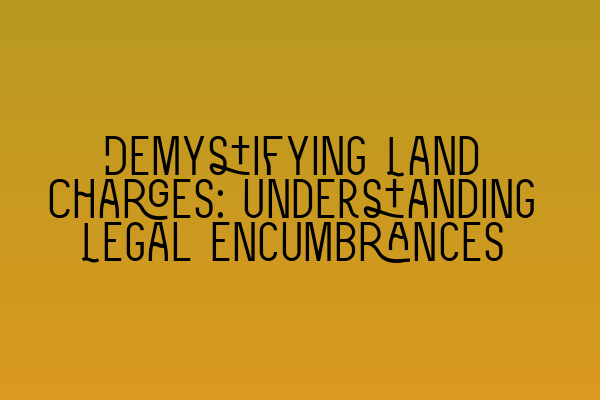Demystifying Land Charges: Understanding Legal Encumbrances
As a property owner or someone looking to purchase a property, understanding the concept of land charges and legal encumbrances is crucial. These terms may seem intimidating at first, but they play a significant role in property transactions and can affect the ownership and use of land. In this blog post, we will demystify land charges and provide a comprehensive overview to help you navigate this complex area of property law.
What are Land Charges?
Land charges are restrictions or burdens that can be registered against a property. These charges serve as a notice to potential buyers and lenders regarding any legal or financial obligations or restrictions that may affect the property. They can include charges such as mortgages, leases, restrictive covenants, easements, and other rights or interests.
Understanding Legal Encumbrances
Legal encumbrances are specific types of land charges that can have a significant impact on the property. Let’s take a closer look at some common types of legal encumbrances:
1. Mortgages: A mortgage is a loan secured against the property. When you purchase a property with a mortgage, the lender holds a legal charge over the property until the loan is repaid. This means that if you fail to repay the loan, the lender can seek to repossess the property and sell it to recover their debt.
2. Leases: A lease grants a person (known as the tenant or lessee) the right to occupy a property for a specified period of time. The leaseholder pays rent to the landlord, who retains ownership of the property. Leases can range from short-term agreements to long-term leases lasting several years.
3. Restrictive Covenants: Restrictive covenants are agreements that impose specific restrictions on the use or development of a property. These restrictions may include limitations on building extensions, alterations, or the types of businesses that can operate on the premises. Restrictive covenants are typically put in place to maintain the character or value of a property or surrounding area.
4. Easements: An easement is a right granted to a person or entity that gives them a non-possessory interest in another person’s property. Common examples of easements include rights of way, rights to access utilities, or rights of light. Easements can be created through express agreement, necessity, or long-standing use.
Why You Need to Understand Land Charges
Understanding land charges and legal encumbrances is essential for several reasons:
1. Protecting your investment: Knowing about any charges or encumbrances on a property before purchasing it can help you assess the potential risks and protect your investment. You can negotiate terms or seek legal advice to ensure the charges or encumbrances will not hinder your intended use of the property.
2. Transaction considerations: Land charges can affect the viability and terms of property transactions. Lenders may be reluctant to provide financing or impose stricter conditions if there are significant encumbrances. Sellers may also need to obtain consent or release from certain parties before completing a sale.
3. Compliance with legal obligations: Failing to comply with legal obligations attached to land charges can have serious consequences. For example, breaching a restrictive covenant may result in legal action and costly damages. It is crucial to understand and adhere to any obligations associated with the encumbrances on your property.
4. Future planning: If you are looking to develop or alter a property, understanding the existing legal encumbrances is essential. Restrictive covenants or easements may restrict your plans or require you to seek appropriate permissions or agreements from the relevant parties.
Navigating Land Charges
To navigate land charges effectively, it is important to conduct thorough research and seek professional advice. Working with an experienced property solicitor can provide you with the guidance and expertise needed to understand and manage land charges during property transactions.
At SQE Property Law & Land Law, our team of solicitors specializes in all aspects of property law, including land charges and legal encumbrances. We can assist you in conducting comprehensive due diligence, reviewing documentation, and advising on the best course of action to ensure your property transactions proceed smoothly.
For additional resources and information about the Solicitors Qualifying Examination (SQE) and property law, we recommend checking out these related articles:
– SQE 1 Practice Exam Questions: Take a practice quiz to assess your knowledge and preparedness for the SQE 1 examination.
– SQE 1 Practice Mocks FLK1 FLK2: Access practice mocks for the SQE 1 examination to familiarize yourself with the exam format and content.
– SQE 2 Preparation Courses: Explore our comprehensive preparation courses for the SQE 2 examination, designed to equip you with the necessary skills and knowledge.
– SQE 1 Preparation Courses: Discover our tailored courses to help you prepare for the SQE 1 examination, covering all relevant topics and modules.
– SRA SQE Exam Dates: Stay updated on the latest exam dates for the Solicitors Qualifying Examination (SQE) set by the Solicitors Regulation Authority (SRA).
In conclusion, land charges and legal encumbrances are integral parts of property law that require careful consideration and understanding. By demystifying these terms and their implications, we aim to empower individuals and businesses to make informed decisions when dealing with property transactions. For professional guidance and assistance with land charges, contact SQE Property Law & Land Law today.
